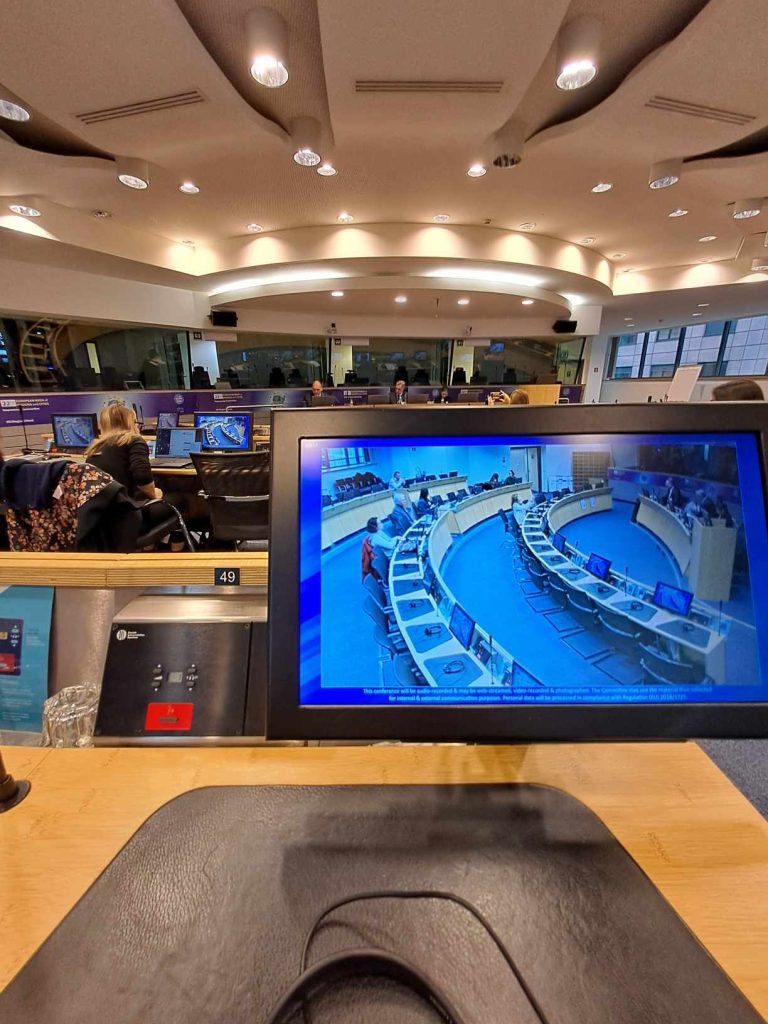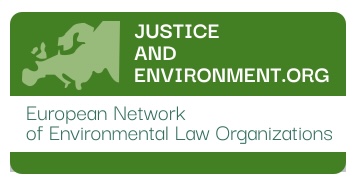

Evromegdan/BlueLink.net
October 15, 2024. Brussels. Justice and Environment strengthened the connection between human rights and climate change in the EU Committee of the Regions.
Young people cried while senior women celebrated at the same time in a Strasbourg courtroom on April 9, 2024. Then suddenly both groups congratulated one another, on the occasion of arguably the greatest court victory to date for climate rights – a novel legal vision embraced by environmental lawyers and climate advocates across Europe. Half a year later many of them gathered in Brussels to dwell on its developments and future prospects.
The bitter-sweet moment in April was caused by two rulings of the European Court of Human Rights (ECHR) on two prominent climate justice and intergenerational equity cases. In the first one the plaintiffs Duarte Agostinho and Others lost their case against Portugal and 32 other states, while in the second the collective known as the KlimaSeniorinnen Schweiz won against Switzerland.
It was the Senior Swiss Women’s Board Member Dr Elisabeth Stern who recalled the heart-warming ECtHR courtroom experience at an international conference in Brussels on October 15, 2024: “We all congratulated one another, because the (ECHR’s) ruling was very clear: climate protection is a Human Right! A state has the obligation to effectively protect its people against serious effects of climate change”.
Climate rights launched
Stern’s clear conclusion was a highlight of the event which gathered some 150 lawyers, legal experts, researchers and climate advocates from across the EU, online and physically. Connecting human rights to climate change was the primary purpose of the conference, held at the EU’s Committee of the Regions in Brussels by Justice and Environment (J&E) – a network of lawyers and organizations supporting access to environmental justice across Europe.
The event in Brussels concluded a pilot EU-funded project entitled Discussions and Actions on Climate and Environment (DACE). J&E implemented the project in partnership with the International Institute for Law and the Environment (IIDMA, Spain), BlueLink (Bulgaria), The Alliance of the Austrian Environmental Movement (ÖKOBÜRO, Austria), the Environmental Management and Law Association (EMLA, Hungary), the Legal Center for Human Rights Protection (PIC, Slovenia), and the Estonian Environmental Law Centre (EELC, Estonia).
“Our work reflects upon the increasing global dynamics of the climate change agenda by applying the rule of law and relevant rights”, said Csaba Kiss – a Hungarian environmental lawyer and J&E coordinator, who opened the conference. The DACE project explored and promoted climate rights – a novel concept capturing the existing and nascent categories of rights at international, EU and national level with relevance to climate change, including all substantive and procedural rights related to or affected by climate change.
Empowering civic legal action
“We see climate rights as vehicles towards a just and engaging society, in which climate justice and the protection against the impacts of climate change are high on the agenda of the governments, businesses and mass media”, explained Plamen Peev. As senior legal expert at BlueLink, Peev was the lead author of an authoritative scoping study of climate rights, which was presented at the conference. It launched a solid concept for climate rights that would inform activities on national and EU level.
Defining and understanding climate-related justice and liability is timely, but requires broader engagement of different stakeholders and perspectives, said Bulgaria’s former environment minister and EU Commissioner nominee Julian Popov, a keynote speaker to the conference. Jacob Werksman, principal advisor and lead negotiator at the European Commission’s DG CLIMA also agreed that climate justice in itself is a “contested term”.
Werksman criticized international decision-making rules based on consensus. It produces decisions that drift towards the lowest common denominator, which is not necessarily helpful, the EU climate negotiator explained. The resulting international legal instruments and treaties, including the Paris Agreement, tend to protect the status quo rather than delivering clear rules necessary to sort out disputes. In the open space left by the Paris Agreement are now stepping in international courts, and national jurisdictions are sending more promising responses, Werksman observed. He distinguished among: procedural justice; distributive justice – which defines and rationalizes states’ responsibilities; restorative justice which provides relief or remedy; and intergenerational justice.
Intergenerational justice
“Only those who are alive today need to address the concerns of those who will be born in the future”, Werksman pointed out. He went on asserting that a structural problem occurs if the states do not allow individuals or collectives to participate effectively in the designing of climate laws. There is a risk that the effort to provide justice may prevent the delivery of justice, he concluded.
Climate rights and climate citizenship need to be interpreted with special regard to children, asserted Kata Dozsa, associate professor at the Brussels School of Governance at the Free University of Brussels. Concern about future generations has a major potential for transformative legislative impact, added Dr. Katalin Sulyok, an advisor to the Ombudsman for Future Generations of Hungary.
Recent legal practice changes demonstrated by the ECtHR’s ruling on the KlimaSeniorinnen case evoke the concept of intergenerational equity, Sulyok said. She clarified that the goal of securing a safe climate for future generations is enforced by international courts along three main types of legal norms and standards:
- extending human rights to the future;
- imposing duty of care obligations towards the future by states and corporations alike; and
- abating age-based discrimination.
Corporations liable
Ana Barreira, a Spanish lawyer and adjunct professor of international environmental law at the IE University argued for multilevel governance in climate law implementation stressing the role that regions and municipalities play to achieve the objectives of the Paris Agreement. Barreira is also the founding director of IIDMA.
Some 68% of Slovenians believe that it is the state’s responsibility to protect citizens from negative consequences of climate change, according to a national survey held by the DACE project team in 2023. At the same time 83% of Slovenian residents support legal responsibility of private and public companies to reduce emissions in line with the Paris Agreement according to a YouGov, 2023 survey.
Aljosa Petek, a lawyer at PIC pointed out that corporations have a huge contribution to climate change, therefore 82% of Slovenians believe that the banks are responsible for the actions of companies in which they invest. Remarkably, 73% think that people should have the right to directly sue large emitters of GHG for compensation for damages done to them through climate change consequences. These include floods, draughts, heat waves etc., Petek clarified.
Triin Jaadmaa, a lawyer at EELC presented Estonia’s Supreme Court ruling which revoked the building permit of a new shale oil energy facility constructed by Enefit. Jäädmaa was one of two lawyers of the plaintiff – Fridays for the Future – Estonia. The court decision confirmed that the law obliges public authorities to address the climate crisis and that the climate targets set in national development documents must be taken into account, she pointed out.
In addition to the legal reasoning, the Estonian Supreme Court based its decision also on science, by referring to IPCC reports and to Estonia’s greenhouse gas projections.
Communicating climate rights in a carbon-loaded media field
Withdrawal from scientific reasoning and insufficient quality scientific reporting – independent from state and industry interests – is among the factors which make climate rights public communication an “uphill struggle”, said Pavel Antonov, BlueLink executive editor. Presenting the DACE project’s communication goals, which BlueLink was also responsible for, Antonov observed increasing bias against EU climate policies which gradually penetrates the journalistic and media field. “Economic and political dependencies prevent mainstream media from adequately informing the public about climate change and defending the rights of affected people and communities”, Antonov commented.
The project Discussions and Actions on Climate and Environment is funded by the European Union and coordinated by J&E in partnership with the International Institute for Law and the Environment (IIDMA, Spain), BlueLink Foundation (Bulgaria), The Alliance of the Austrian Environmental Movement (ÖKOBÜRO, Austria), the Environmental Management and Law Association (EMLA, Hungary), the Legal Center for Human Rights Protection (PIC, Slovenia), and the Estonian Environmental Law Centre (EELC, Estonia).
All views and opinions expressed are the authors’ only and do not necessarily reflect those of the European Union (EU) or of the granting authority – the European Education and Culture Executive Agency (EACEA). Neither the EU nor EACEA can be held responsible for them.

